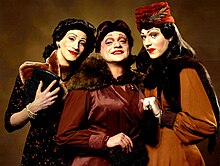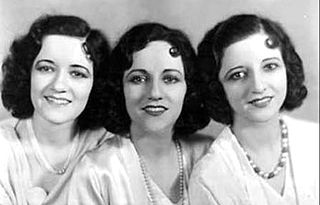
The Boswell Sisters were an American close harmony singing trio of the jazz and swing eras, consisting of three sisters: Martha Boswell, Connee Boswell, and Helvetia "Vet" Boswell. Hailing from uptown New Orleans, the group was noted for their intricate harmonies and rhythmic experimentation. They attained national prominence in the United States in the 1930s during the twilight years of the Jazz Age and the onset of the Great Depression.
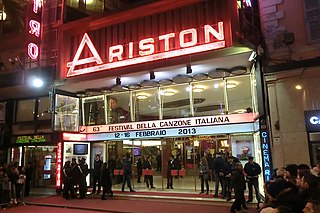
The Festival della canzone italiana di Sanremo is the most popular Italian song contest and awards ceremony, held annually in the city of Sanremo, Liguria, and consisting of a competition amongst previously unreleased songs. Usually referred to as Festival di Sanremo, or outside Italy as Sanremo Music Festival, it is the music equivalent to the Premio Regia Televisiva for television, the Premio Ubu for stage performances, and the Premio David di Donatello for motion pictures.

The Trio Lescano was a female vocal group singing in Italian from 1936 to 1950, originally consisting of Hungarian-Dutch sisters Alessandra Lescano, Giuditta Lescano and Caterina "Caterinetta" Lescano. Caterinetta left the group in 1946 and Italian singer Maria Bria took her place.

La7 is an Italian free-to-air television channel owned by Cairo Communication. Until 2013 it was owned by Telecom Italia Media and operated by Telecom Italia.

Matteo Messina Denaro, also known as Diabolik, is a Sicilian Mafia boss. He got his nickname from the Italian comic book character of the same name. He is considered to be one of the new leaders of Cosa Nostra after the arrest of Bernardo Provenzano on 11 April 2006, and the arrest of Salvatore Lo Piccolo in November 2007. Matteo Messina Denaro became known nationally on 12 April 2001 when the magazine L'Espresso put him on the cover with the headline: Ecco il nuovo capo della Mafia. He has been a fugitive on the most wanted list since 1993 and according to Forbes magazine he is among the ten most wanted criminals in the world. With the deaths of Bernardo Provenzano in 2016 and Salvatore Riina in 2017, Messina Denaro is seen as the unchallenged boss of all bosses within the Mafia.

Giuseppe "Pippo" Barzizza was an Italian composer, arranger, conductor and music director.

Ilary Blasi is an Italian showgirl, model, television personality, and former child actress.

Manuela Arcuri is an Italian actress, model and soubrette. She was the protagonist of two successful fiction L'onore e il rispetto and Il peccato e la vergogna.

Venantino Venantini was an Italian film actor. He was the father of Victoria Venantini and Luca Venantini and appeared in more than 140 films between 1954 and 2018.
The Acqui Award of History is an Italian prize. The prize was founded in 1968 for remembering the victims of the Acqui Military Division who died in Cefalonia fighting against the Nazis. The jury is composed of seven members: six full professors of history and a group of sixty (60) ordinary readers who have just one representative in the jury. The Acqui Award Prize is divided into three sections: history, popular history, and historical novels. A special prize entitled “Witness to the Times,” given to individual personalities known for their cultural contributions and who have distinguished themselves in describing historical events and contemporary society, may also be conferred. Beginning in 2003 special recognition for work in multimedia and iconography--”History through Images”—was instituted.
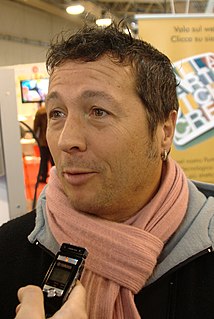
Paolo Belli is an Italian singer and television presenter.

Loretta Goggi is an Italian singer, actress and TV host.

Daniela Poggi is an Italian film and stage actress and television presenter.

The Sanremo Music Festival 2008 was the 58th Sanremo Music Festival, held at the Teatro Ariston in Sanremo. The first and the second night of the show were held on 25 and 26 February 2008, while the last three nights were held from 28 February and 1 March 2008.
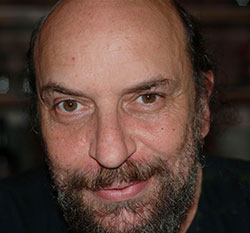
Maurizio Guarini is a self-taught keyboardist, multi-instrumentalist and composer, best known as a member of the progressive rock band Goblin.
This is a list of Italian television related events from 2000.
The term State-Mafia Pact defines the negotiation between important Italian functionaries and Cosa Nostra members, that began after the period of the 1992 and 1993 terror attacks by the Sicilian Mafia with the aim to reach a deal and so to stop the attacks. In summary, the supposed cornerstone of the deal was the end of the so-called "massacres season" in return for detention measures attenuation expected by Italian article 41-bis, thanks to which Antimafia pool led by Giovanni Falcone condemned hundreds of mafia members to the so-called "hard prison regime". The negotiation hypothesis has been the subject of long judicial investigations - not yet concluded - and some journalistic investigations.

Gisella Giovenco is an Italian painter, stylist and publicist.
This is a list of Italian television related events from 1987.
This is a list of Italian television related events from 1979.
